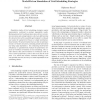Free Online Productivity Tools
i2Speak
i2Symbol
i2OCR
iTex2Img
iWeb2Print
iWeb2Shot
i2Type
iPdf2Split
iPdf2Merge
i2Bopomofo
i2Arabic
i2Style
i2Image
i2PDF
iLatex2Rtf
Sci2ools
132
click to vote
ESCIENCE
2007
IEEE
2007
IEEE
Model-Driven Simulation of Grid Scheduling Strategies
Simulation studies of Grid scheduling strategies require representative workloads to produce dependable results. Real production Grid workloads have shown diverse correlation structures and scaling behavior, which are different than the characteristics of the available supercomputer workloads and cannot be captured by Poisson or simple distributionbased models. We present models that are able to reproduce various correlation structures, including pseudo-periodicity and long range dependence. By conducting model-driven simulation, we quantitatively evaluate the performance impacts of workload correlations in Grid scheduling. The results indicate that autocorrelations in workloads result in worse system performance, both at the local and the Grid level. It is shown that realistic workload modeling is not only possible, but also necessary to enable dependable Grid scheduling studies.
Distributed And Parallel Computing | ESCIENCE 2007 | Grid Scheduling | Grid Scheduling Strategies | Production Grid Workloads |
Related Content
| Added | 02 Jun 2010 |
| Updated | 02 Jun 2010 |
| Type | Conference |
| Year | 2007 |
| Where | ESCIENCE |
| Authors | Hui Li, Rajkumar Buyya |
Comments (0)

